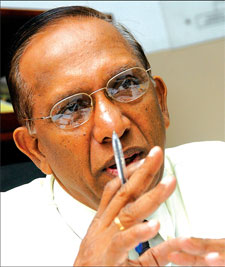|

Female population on the rise:
'Expected outcomes not yet achieved'- Prof. Indralal de Silva

Nipuni WIMALAPALA
The female population of Sri Lanka has significantly increased over
the past two decades. There are a number of areas related to female
population that have to be discussed. Prominent ones are the size and
the portion of female population, life expectancy compared to men,
migration, Labour force participation or employment aspects with
comparison to men, education and health of female population.
Senior Professor of Demography, Dean, Faculty of Arts, Colombo
University, Prof. Indralal De Silva spoke to Daily News illustrating the
outcomes related to the growth of female population in Sri Lanka.
According to Prof. Silva, Sri Lankan population has increased by 2.4
million from 1871 to 2001. In 1871 it was about 18.7 million and in 2011
it has become 20.5 million. During last 20 years, there is a noticeable
increase in female population. In 1981 the sex ratio was 104 which means
104 men for 100 women. But when it comes to 2001, there are only 97 men
for 100 women. It reveals that presently Sri Lankan population is rather
'feminist' compared to the past. In the future this trend is expected to
be more aggravated. It is projected that in another 20 years the sex
ratio will be 94, which means, only 94 men for 100 women.
 |
|
Picture by
Ruwan De Silva |
When age groups are considered, it is visible that there is a
remarkable shortage of men compared to women in marriageable age group
between 20 to 39. One of the reasons is that a considerable number of
men have passed away in the battle field during war times. Another
reason is undocumented migration. A large number of men migrate to
countries like, Italy, France, Germany without having legal
documentations. This shortage of men creates several social issues.
As Prof. Sillva stated, life expectancy is another area which is very
important. Life expectancy in Sri lanka is really favourable to women
rather than men. A woman's life expectancy is 77-78 years while a man's
life expectancy is only 68 years according to 2001 reports. This is a
considerable difference which witnesses that women are capable of living
longer lives compared to men. The main reason for this issue is health
problems men face. Men's life styles, eating patterns, smoking,
consumption of liquors and working for long hours decline their health
status. Communicable diseases take away most of the lives while other
illnesses such as heart troubles, cancers,respiratory system related
problems etc cause a considerable number of deaths. Women are more
concerned about their health conditions that they always bring their
lunch from home and rarely eat from shops. They take medicine often even
when they have slight illnesses. So they are more capable of living
longer lives.
Though females live longer lives, it leads to several matters.
Normally women marry men who are a bit older to them. Since they live 10
years less than women, it creates problems to women. Women have to take
responsibilities alone and to live the latter part of their lives alone.
"Another serious issue of growth of female population is migration.
Closer to 2 million Sri Lankans are working in the Middle East and
elsewhere. More than 60 percent of that stock is females who work as
under contract workers.
Bulk of them is in Middle East and the unfortunate thing is 80-85
percent of our females go for unskilled category. So Sri Lanka has been
labeled as a country which sends unskilled workers. A very large segment
of women go as house maids", noted Prof. Silva.
"When the international labour migration is concerned,in Sri Lanka
first it was men who went abroad. Females started to migrate in the
later part of the 80s. Except in 2008, during the 1990s and early 2000,
in all other years it was a female dominant migration. In 2008 the male
proportion was larger. However we have developed a migration policy in
Sri Lanka and under it, we cannot resist or ban any person going to
other countries. But there are some regulations that limit females going
to work as house maids. The policy discourages many aspects such as
women who have children less than 5 or 3 years cannot go abroad. But it
is extremely difficult to implement strict regulations due to human
rights", he further stressed.
As he mentioned, almost 70 percent of females who migrate to Middle
East and else where belong to 25-44 age group. That indicates that 98
percent of them are married with children. Because of their family
commitments they migrate which create thousands of long term social
issues.
"We need to improve their status through trainings and guide them to
involve in employments like nursing, hotel industry etc. Another issue
is their income is not being productively utilized by the families due
to consumption of liquor, unnecessary food items, and extra marital
relationships. Children are in a vulnerable condition to different
harassments such as collapse of education, sexual exploitation than the
children who live with their mothers. Family solidarity is collapsed.
Since the family power is declined, they are very vulnerable for so many
calamities. If mother is around children's living condition, education
and physical growth are in a better position. Government still does not
have a very good programme to save this money. Government should
implement good policies and programmes to uplift investments and savings
of this foreign currency for their wellbeing",Prof. Silva noted.
Education
According to Prof. Silva, one of the critical areas is education.
Obviously, majority of our university population is females. But
unfortunately it's productive outcomes are not seen in the work force.
In 1981, Sri Lankan labour force was 5 million and 25 percent of it was
women. In 2010, it has increased to 8.3 million and women's contribution
is still 33 percent. When it is compared to the female population who
gain higher education, this percentage is not satisfactory. Most of the
women keep away from working after getting married due to their family
commitments. To achieve the government's target, wonder of Asia, women's
participation in work force is really essential without letting them
being marginalized as domestic wives. To increase their contribution,
government has to introduce more flexible employments to women.
"The most prominent factor is, Sri Lanka's highest foreign exchange
earner is garment industries where 85-95 percent of workers are women.
The second highest foreign remittance comes from Middle East where 60-65
percent of workers are women. The third highest income comes from tea
and rubber export industry where most of the workers are women. The
obvious fact is all of them are unskilled or semi skilled labours. It
badly affects on women's status. My idea is, the government has to
generate more suitable employments to women and the system has to
flexible enough for women to work using their real capabilities. To
achieve the expected targets of country's development, women's
participation must be increased in a productive manner", Professor
stressed.
As he mentioned, the other area to be uplifted is, parliamentary
membership of females. Compared to the population proportion of women,
they get very low number of membership in the parliament. This has to be
changed. And also an attitudinal change must be done to upgrade women's
status in Sri lanka..
Though female population is rapidly increasing in Sri Lanka, the
expected out comes are not achieved yet. To absorb the maximum product
of the growth of female population, responsible parties have to do the
required changes.
Protecting the rights of female tea plantation workers
Nipuni WIMALAPALA
Elegant hands which pluck tea leaves undoubtedly help keep the
country's economy afloat though they do not receive the expected living
status due to many reasons. Women who work in tea plantation areas are
one of the poorest communities who undergo a large number of
difficulties such as low wages, less health facilities, cultural and
political isolation etc.
 |
|
Menaha
Kandasami. Picture by Nissanka Wijerathne |
A well educated woman, Menaha Kandasami from Badulla, a tea
plantation area whose mother was a tea plucker while father was a trade
unionist spoke to Daily News stressing the necessity of uplifting the
condition of women in tea plantation areas in Sri lanka.
Kandasami is the president of the Red Flag Union, under which they
conduct Red Flag Women's Movement. She is a woman activist who wants to
do her best for her own community. According to her, the Women's
movement specifically looks into the issues of female tea plantation
workers and they try to upgrade women's participation as leaders of tea
plantation trade unions.
Kandasami stated that the tea plantation communities are coming
forward in education wise, wage wise and health wise though there are
number of remaining issues compared to the past. But if it is compared
with other communities, it is really backward. Being in the 21st century
these communities are experiencing the 15th century's facilities.
Specifically they talk about trade unions. Though 55 percent of tea
plantation workers are women, their participation in trade union
leadership is considerably low. They do not play a noticeable role in
decision making and organizing. Without having women leadership, it is
really difficult to upgrade women's condition.
"There are a lot of capable women who are talented having leadership
qualities who can become very good leaders. But they need some guidance
to polish their capabilities. To achieve the desired capability, we
decided to hold a conference on December 17 and 18 ,2011 in Kandy with
the participation of members from India, Bangladesh, Nepal, Malaysia,
Indonesia and Sri Lanka through which we can make women aware of the
issues they face. Some examples are how to react when the estate
management terminates their work, their rights, legal actions they can
go for etc. This includes training programmes, trade union education,
awareness programmes of gender, class, rights, bargaining", Kandasami
stressed.
According to the woman activist, the conference mainly focuses on
woman tea plantation workers, trade unionists and more than 2000
domestic workers who are not yet legally accepted as workers. Apart from
them they focus garment factory workers who work around tea plantation
areas. They want to develop from the grass root level. There were women
leaders who never did any important thing other than all the stereotyped
work. The attitudes must be changed. Through this they try to reduce
poverty and violence against women.
"Women are isolated and marginalized in so called tea plantation
areas. We are doing a research on "Poverty, violence against women and
women's leadership in tea plantation trade unions" and we expect to
present it in our seminar. Local tea plantation trade union people,
women activists and tea plantation trade union researchers are invited
for it. We want to emphasize that there should be structural changes to
uplift women's position with the participation of both men and women. We
need more and more researches to identify the issues which are to be
addressed immediately. In between the panels we hope to develop an
argument as to what steps have to be taken and our capabilities to
achieve the expected standards. I strongly believe that this would be a
very positive, constructive and effective criticism which will help us
reach out targets" Kandasami noted. |



